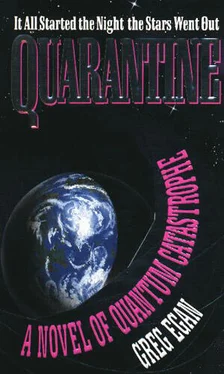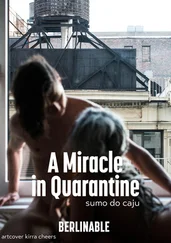Despite having been merely lucky, Vincent and I were, predictably, portrayed as heroes. I didn't mind — it meant that I was now virtually guaranteed promotion to the counter-terrorist unit. The media attention was tiresome, but I gritted my teeth and waited for it to pass. Karen resented the whole thing, and I couldn't blame her; none of our friends seemed to want to talk about anything else, and she must have been as sick of hearing the story as I was of telling it.
Still worse, Karen's well-meaning brother dropped in one Sunday afternoon with recordings of every interview I'd given — primed, as the Department insisted — which we'd taken great pains to avoid when they'd been broadcast. We had to sit through them all. Karen loathed seeing me primed, almost as much as I did myself. "The zombie boy scout' she called me, and I couldn't disagree; the cop with my face on the HV was so bland, so earnest, so blinkered, so fucking sensible, it made me want to gag. (There may be people born that way, but not many, and you pity them.)
Every cop has no less than six standard 'priming mods', PI to P6,but it's P3which imposes the mental state appropriate for active duty, it's P3which really makes you primed. It had always been clear to me that what P3did was cripple the brain — efficiently, reversibly, and to great advantage, but there was no point being squeamish or euphemistic about it. The priming mods made better cops, the priming mods saved lives — and the priming mods made us, temporarily, less than human. I could live with that, so long as I didn't have my nose rubbed in it too often. The 'priming drugs' of the bad old days — a crude, purely pharmaceutical attempt to suppress emotional responses, heighten sensory awareness and minimize reaction times — had caused a number of side-effects, including unpredictable transitions between the primed and unprimed states, but the arrival of neural mods had banished all such complications. The partitioning of my life was simple, clear-cut, absolute: on duty, I was primed; off duty, I wasn't.
There was no possibility of ambiguity, no question of one side contaminating the other.
Karen had no professional mods; doctors, the eternal conservatives, still frowned upon the technology — but differential malpractice insurance premiums, amongst other things, were gradually eroding their resistance.
On December 2nd, I learnt that my promotion had come through — a few hours before I read about it in the evening news. That was a Friday; on the Saturday, Karen and I, and Vincent and his wife Maria, went out to dinner together to celebrate. Vincent had also been offered a position in the unit, but he'd declined.
'Bad career move,' I said, only half teasing. We'd scarcely had a chance to discuss it before; primed, such topics were unmentionable. 'Counter-terrorism is a growth sector. Ten years in this unit, and I can quit the force and become an obscenely overpaid consultant to multinationals.'
He gave me an odd look, and said, 'I guess I'm just not that ambitious.' And then he took Maria's hand, and squeezed it. It was hardly an extravagant gesture, but I couldn't get it out of my mind.
I woke in the early hours of Sunday morning, and I couldn't get back to sleep. I climbed out of bed; Karen could always sense my wakefulness, and it always seemed to disturb her far more than my absence. I sat in the kitchen, trying to come to a decision, but only growing more angry and confused. I hated myself, because I hadn't once stopped to think that I might be putting her at risk. We should have talked it through, before I'd accepted the promotion — and yet the very idea of any such discussion seemed obscene. How could I ask her? How could I acknowledge the slightest real danger and admit in the same breath that, with her permission, yes, I'd still go ahead and take the job? And if, instead, I simply changed my mind and turned it down without consulting her, in the end she'd drag the reason out of me — and she'd never forgive me for having excluded her from the decision.
I walked over to a window and looked out at the brightly lit street; ever since The Bubble, it seemed to me, streetlights had been growing more powerful year by year. Two cyclists rode by. The window pane shattered outwards, and I followed the shards through the empty frame.
Unbidden, the priming mods snapped into life. I curled up and rolled as I hit the ground; P4saw to that. I lay on the grass for a second or two, bleeding and winded. I could hear the flames behind me, I could feel my heart accelerate and my skin grow cold as PI shut down peripheral circulation — a controlled version of the natural adrenalin response — but I was insulated from my body's agitation, I had no choice but to remain calmly analytic. I got to my feet and turned around to assess the situation. Tiles from the roof were scattered on the lawn; the bomb must have been in the ceiling, close to the back of the house, probably right above the bedroom. I could see patches of a bubbling, gelatinous substance sliding down the remnants of the inside walls, carrying with it sheets of blue flame.
I knew that Karen was dead. Not injured, not in danger. With nothing to shield her from the blast, she would have died instantly.
I've thought about it a great deal since, and I always reach the same conclusion: any ordinary person in the same situation would have run back in, would have risked their life — in shock, confused, disbelieving, would have done the most dangerous and futile thing imaginable.
But the zombie boy scout knew there was nothing he could do, so he just turned and walked away. And, knowing the dead were beyond his help, he turned his attention to the needs of the survivor.
I try, and fail, to think of a single, compelling reason why the Children can't be involved. Abducting braindamaged mental patients conceived on Bubble Day may not be something they've done before, but no doubt there's a dearth of suitable candidates — and, short of an actual precedent, the whole absurd crime does have an undeniable Child-like ring to it. It's also true that the Children aren't known to have been active in New Hong Kong, but that doesn't mean that they don't have a cell here, a safe house somewhere in the city. As few as four or five people could have smuggled Laura in.
I pace the room, trying to stay calm. I feel more indignation than fear — as if my client should have known about this and warned me from the start. That's absurd, but the fact remains: I'm not being paid enough to fuck with terrorists, least of all the Children. They may not have deigned to make a second attempt on my life — a policy they seem to apply to all chance survivors, as if refusing to acknowledge failure — but I have no intention of reminding them of my existence, let alone providing them with a whole new reason to put me back on their hit list.
I call the airport; there's a flight out at six. I book a seat. I pack. It all takes a matter of minutes. Then I sit on the bed, staring at my suitcase — and gradually I start to regain a sense of perspective.
So, Laura was conceived on — or close to — Bubble Day. But is that information, or noise? Law enforcement bodies around the world have programmed computers to tirelessly pursue the Children's obsessions — dates, numerology, heavenly conjunctions, ad nauseam — and the results have always been the same: overflowing files full of spurious correlations and meaningless coincidences; terabytes of junk. One way or another, about twenty per cent of everything can be made to look potentially significant to the Children. The fraction of this that's genuine is infinitesimal; in practice, the method is about as useful as considering everyone with eyes the same colour as Marcus Duprey's to be a suspected terrorist.
Читать дальше










